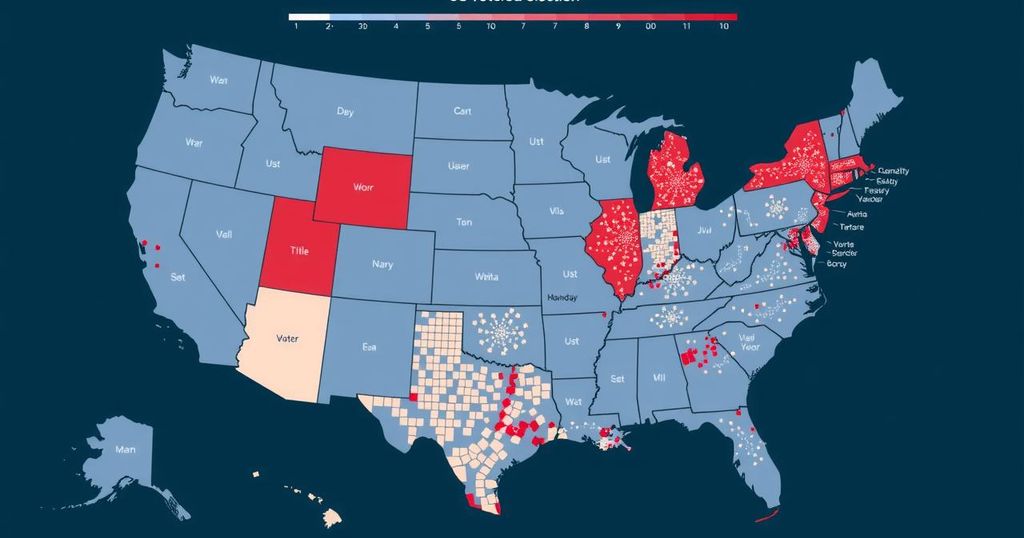Historical Voting Patterns of Key Swing States in US Elections

The seven swing states—Pennsylvania, Georgia, North Carolina, Michigan, Arizona, Wisconsin, and Nevada—are forecasted to be critical in determining the outcome of the presidential election. Historically, these states have varied in their voting preferences between Republican and Democratic candidates. Recent polls indicate close races in these key battlegrounds as both candidates vie for their support ahead of election day.
In the context of the upcoming United States presidential election, seven swing states—Pennsylvania, Georgia, North Carolina, Michigan, Arizona, Wisconsin, and Nevada—are poised to significantly influence the electoral outcome. Historically, these states have exhibited fluctuating voting patterns, often toggling between Republican and Democratic candidates. Recent trends indicate a competitive landscape, articulating a narrative of shifting political allegiances. Arizona, traditionally a Republican stronghold since the 1950s, notably shifted in 2020 when it voted for Democrat Joe Biden by a mere 0.3 percentage points. This election cycle, forecasts suggest a narrow lead for Donald Trump, who holds a slight edge in voter support. Georgia follows a similar trajectory, having swung to Biden in 2020 after consistent Republican victories since 2000. Current figures reflect a close contest, with Trump slightly ahead. North Carolina has maintained a Republican lean, with Trump winning decisively in the last two elections. As the campaign intensifies, both parties recognize the critical nature of this state, given its competitive margins. In contrast, Nevada, while having voted largely Democratic in recent elections, remains unpredictable, particularly with a significant percentage of nonpartisan voters. Polls indicate a neck-and-neck race, with Trump and Harris within striking distance of each other. Pennsylvania stands as a pivotal battleground, particularly due to its historical pattern of voting for the Democratic candidate until Trump’s surprise victory in 2016. Both campaigns are heavily investing resources here, with the latest polls showing a slight advantage for Harris. Michigan is another key state where Biden narrowly won back the Democratic vote in 2020 after Trump’s unexpected success in 2016, emphasizing the role of minority voters in shaping electoral outcomes. Lastly, Wisconsin showcases a similar narrative, experiencing a partisan shift following years of Democratic dominance prior to Trump’s victory. Biden managed to secure the state in 2020 by a notable margin, reinforcing its status as a contested territory this election cycle. As election day looms closer, the volatility in these seven states will be critical in determining the next President of the United States.
The article discusses the importance of seven swing states in the United States presidential election. These states—Arizona, Georgia, North Carolina, Michigan, Pennsylvania, Wisconsin, and Nevada—are characterized by their unpredictability in voting behavior compared to states that consistently lean towards a particular political party. The text evaluates the historical voting patterns of these states over recent decades, highlighting key elections and demographic influences which contribute to their current status as battlegrounds. With the election approaching, analysts are closely monitoring shifts in voter sentiment within these states that could ultimately decide the election outcome.
In conclusion, the seven swing states are central to the dynamics of the upcoming presidential election, given their fluctuating historical voting patterns and demographic diversity. Each state presents unique challenges and opportunities for both candidates, with polling indicating extremely tight races. As voters head to the polls, the outcomes in these states will not only reflect individual candidate preferences but will also highlight broader electoral trends that may shape future elections in the United States.
Original Source: www.aljazeera.com







